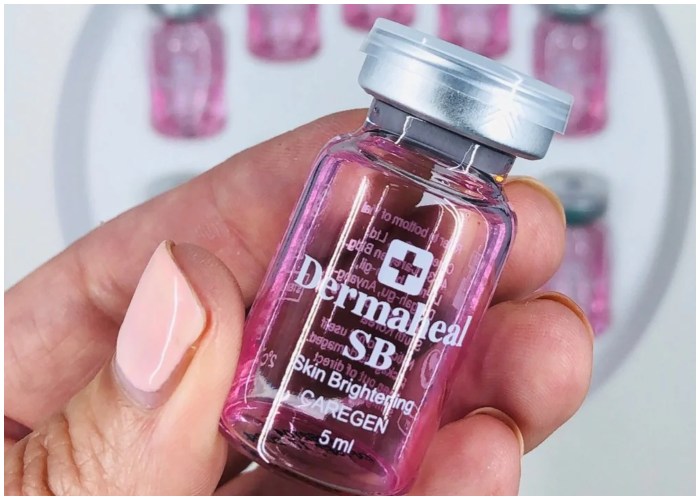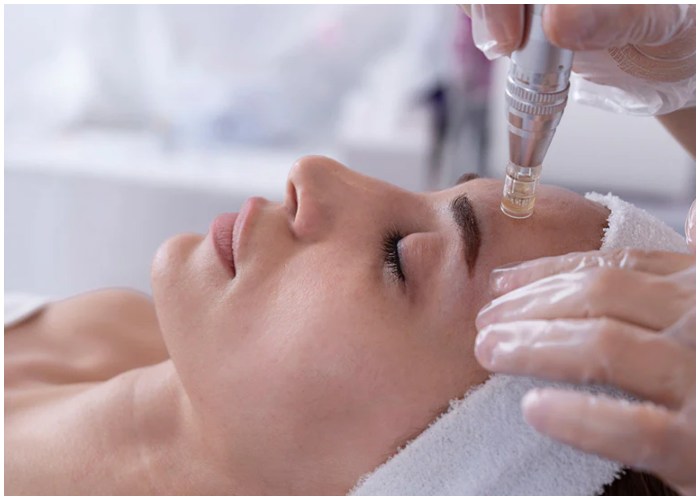Chances are, you’ve heard about microneedling, whether through personal experience or from a friend raving about it in your group chat. The in-office skin-care treatment involves rolling tiny needles over the skin’s surface to create micro-injuries that stimulate the body’s healing process, leading to smoother, firmer skin. While it’s typically done by professionals, the rise of at-home microneedling tools has made the procedure more accessible for those looking to save money. Now, a new TikTok trend has taken things a step further, with users touting “microneedling serums” that claim to offer similar benefits to the professional treatment. But are these products truly the game-changer they’re hyped up to be?
What Are Microneedling Serums?
According to beauty influencers on TikTok, these “microneedling serums” promise smoother skin, smaller pores, and better absorption of skin-care products. The most popular products circulating on the platform include the Medicube Zero Exosome Shot and the VT Cosmetics Reedle Shot, which users describe as “microneedling in a bottle.” These serums allegedly contain microscopic structures that mimic the effect of microneedling, with some users even claiming to feel a slight prickling sensation upon application.
However, these serums aren’t actually made with needles. Instead, they contain spicules—tiny, sharp structures derived from marine sponges. According to cosmetic chemists, spicules give the skin a pricking sensation and help enhance the penetration of active ingredients. They work by creating micro-exfoliations on the outer skin layer, allowing for better product absorption. While this sounds promising, it’s important to note that these serums don’t replicate the actual microneedling procedure performed by professionals.

Do Microneedling Serums Work?
While microneedling serums may help exfoliate and improve the absorption of other skin-care products, dermatologists caution against expecting the same results as professional microneedling. A professional microneedling procedure typically involves needles that penetrate 1.5 to 2.5 millimeters into the skin to trigger collagen production and skin renewal. These serums, on the other hand, work more like mechanical exfoliants and don’t achieve the same level of skin penetration.
Dermatologists explain that while spicules may temporarily improve skin texture and product absorption, their effects are short-lived. Once the spicules dissolve, their stimulation stops. Essentially, while microneedling serums may offer some minor benefits, they don’t come close to the long-term results of a professional treatment. Moreover, there’s limited scientific data to back up the efficacy of these products, meaning much of the buzz is based on anecdotal experiences rather than hard evidence.
Are Microneedling Serums Safe?
Safety concerns also arise with these new microneedling-inspired products. When done by a licensed professional, microneedling is a controlled procedure designed to make precise micro-injuries that promote skin healing. These over-the-counter serums, on the other hand, can be riskier. While spicules may exfoliate and promote absorption, they can also damage the skin barrier if not used properly.
Excessive use of these serums may lead to skin irritation, cuts, or even burns. Dermatologists warn that spicules may not be uniformly distributed in every formula, making it difficult to predict how your skin will react. Users with sensitive skin are especially at risk of developing conditions like eczema, rosacea, or acne flare-ups. For this reason, experts strongly recommend patch testing these products before applying them to your entire face.
Moreover, because these serums create micro-injuries in the epidermis, they could make the skin more susceptible to environmental damage, such as pollution and bacteria. Professional microneedling, when done correctly, ensures that any injury to the skin is minimal and controlled. With DIY products, there’s a higher risk of causing unintended harm.

The Verdict: Stick to Professional Microneedling
While the concept of microneedling serums is innovative, it’s clear that they aren’t a substitute for professional treatments. The results of these serums are more aligned with exfoliation rather than true microneedling, and they lack the precision needed to deliver long-lasting benefits. If you’re looking for smoother skin and better product absorption, traditional exfoliants or face scrubs may offer similar results without the risk of damaging your skin barrier.
For those seeking the full benefits of microneedling—such as collagen production and skin regeneration—it’s best to book an appointment with a licensed dermatologist or esthetician. Not only will you receive a safe, controlled treatment, but you’ll also be able to discuss the best skin-care options for your specific needs.